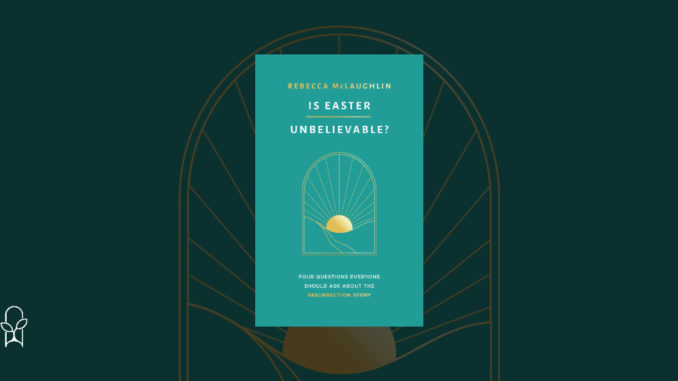
Also by this author: 10 Questions Every Teen Should Ask (and Answer) about Christianity, World on Fire: Walking in the Wisdom of Christ When Everyone’s Fighting About Everything, Is Christmas Unbelievable?: Four Questions Everyone Should Ask about the World's Most Famous Story, Confronting Jesus: 9 Encounters with the Hero of the Gospels, Is Easter Unbelievable?: Four Questions Everyone Should Ask about the Resurrection Story, No Greater Love: A Biblical Vision for Friendship
Published by Good Book Company on February 1, 2023
Genres: Non-Fiction, Apologetics
Buy on Amazon
Goodreads

The resurrection of Jesus from the dead is an extraordinary thing to believe. Such a supernatural event is the stuff of make-believe, many think. Yet millions of Christians around the world believe that Jesus' resurrection was a real, historical event. Indeed, if Christ has not been raised, our preaching is useless and so is your faith and Christians are of all people most to be pitied. (1 Corinthians 15)
In this concise book, respected apologist Rebecca McLaughlin outlines the evidence that Jesus really did rise from the dead and why it's the best news ever.
Is Easter Unbelievable? is a short booklet that asks four questions that everyone should ask about the Resurrection story:
- Did Jesus really live in history? While there isn’t much debate about this at the academic level, there is a lot of popular level debate about the historicity of Jesus. A 2015 survey in the UK found that 40% of respondents either did not believe or were unsure of whether Jesus was a real person. McLaughlin briefly sketches the argument for the historicity of Jesus, focusing on the historicity of the Gospels to make the case. This is a good argument, but it introduces another layer of complexity. I think that making the case that all respected secular historians agree on the historicity of Jesus would have been a stronger argument. That is to say, people who doubt the historicity of Jesus are also going to doubt the historicity of the Gospels. By pointing to them as the primary proof of Jesus, McLaughlin makes the argument more difficult rather than simpler. Focusing on contemporary texts outside of Scripture that mention a historical Jesus would have made a stronger argument.
- Is it fair for one person to die for another? This is more of a defense of the penal substitutionary theory of atonement than it is a defense of Christianity. Again, this is a weaker argument than I’d like to see, because not all forms of Christianity hold stronger to penal substitutionary atonement—including many early Church Fathers. Reducing the complexity of the atonement to a divine legal substitution, while that is the primary metaphor of atonement, is still just that—a metaphor. It is a fair defense of PSA, albeit weirdly James Bond heavy in its explanations. The length of the book prevents anything but a cursory overview.
- How can a rational person believe Jesus rose from the dead? The answer that McLaughlin gives to this question is that Christianity exists, therefore Jesus was resurrected. Or, as she puts it, “Christianity without the resurrection would be like Disney’s Frozen without Elsa.” The strongest argument she gives that a mythologized Resurrection wouldn’t have placed women as the first eyewitnesses to it. But overall, her appeal goes mainly back to Scripture, ignoring that her intended audience already doubts the veracity of Scripture. Some stronger alternative arguments would have been that what is rational doesn’t always end up being what is true or that historically even Jesus’s enemies conceded that the tomb was empty.
- Does anyone genuinely want to live forever? McLaughlin turns back to pop culture here, relying heavily on a Harry Potter metaphor—an interesting choice given the controversy surrounding the author of that series. Just about as much time is spent explaining the plot of the final book as it is talking about the meaning of eternal life. It’s an odd choice that doesn’t hit home for me.
The author of Is Easter Unbelievable? is Rebecca McLaughlin. She’s a smart person, having a PhD in English literature from Cambridge and a seminary degree from Oak Hill in London. She’s also the author of Confronting Christianity, Christianity Today’s 2020 Beautiful Orthodoxy Book of the Year. I’ve not read any of her work other than booklet, but I have to assume it’s better than what I’ve read here. Is Easter Unbelievable? reads like a series of blog posts from a layperson typed up in book form. I get what this was trying to do, but I think it fails to engage. There are so many other similar products in this field—Lee Strobel’s The Case for the Resurrection being the standout—that there’s no reason to engage with subpar products.
